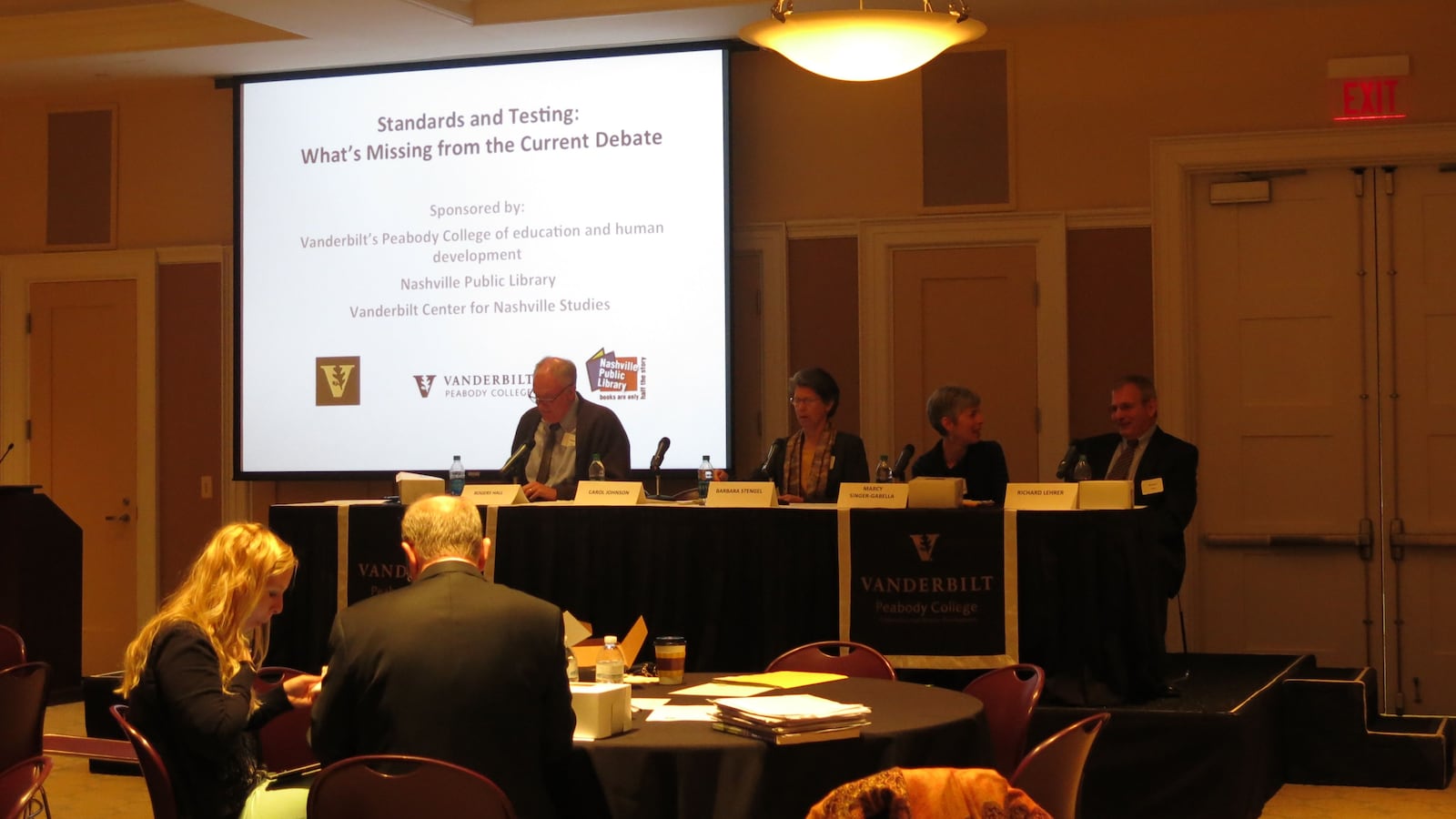While most public opposition to the Common Core State Standards in Tennessee has come from political conservatives wary about losing local control of schools, there’s also concern that the academic standards are inextricably tied to a larger system of high-stakes standardized testing.
It doesn’t have to be that way, concluded a panel of researchers from Vanderbilt University’s Peabody College of Education on Monday during a forum on K-12 education in Tennessee.
Panelists suggested that uniform standards such as the Common Core can lead to more creative teaching, deeper learning and even better tests – if educators and policymakers can reach a consensus on the purpose of tests.
“I think it’s a good idea that we have a statement on what we think every kid in the country should know and be able to do,” said Barbara Stengel, a Peabody professor.
“We have a tendency to think, ‘Yeah, what I’m doing here is the right way to do it.’ We need some way of checking that, and standards are a good way to do that,” Stengel said. “Stated standards take me out of my corner, my community, even my state, and remind me what kids out there in the wide world are doing.”
In Tennessee, the Common Core and the impending arrival of a new standards-aligned assessment have dominated much of the debate about public education during the last year, including a handful of bills filed this year in the Tennessee General Assembly that would scrap the state’s current standards.
Panelists said Common Core standards and Next Generation – the national science standards developed by 26 states, including Tennessee – provide a springboard for students to “receive” math and science knowledge through passive lectures, but also to generate the knowledge themselves through hands-on classroom activities.
However, once-a-year tests mandated by the federal government can’t assess that kind of nuanced learning and don’t help teachers improve instruction, said Rich Lehrer, another Peabody professor
“If we want to engage children and older students in the production of mathematics and science knowledge, then there are very severe limitations of one-time tests to do that,” he said. “We’re going to have to broaden what we think of assessments.” As an example of a high-quality assessment, he cited a classroom experiment on silkworms, complete with open-ended, qualitative answers.
Marcy Singer-Gabella, the chief academic officer for Project GRAD, a partnership between Vanderbilt and Metropolitan Nashville Public Schools, said such an assessment is more helpful to teachers because it gives insight into students’ ability to reason. “If we are unable to see what is happening inside the minds of students, it’s very difficult to know what I should be doing differently tomorrow,” she said.
The conversation around assessments changes, however, when the primary function of tests is to to make decisions about teacher hiring and firing or school closures — an idea that all of the panelists were wary of.
“We don’t understand the impacts of high-stakes testing,” Singer-Gabella said. “In fact, there is so much noise in the system around testing that it is at our peril that we make consequential decisions based only on test scores.”
Singer-Garbella added that research shows that pegging teachers through test scores is especially problematic – since an individual teacher’s impact on student learning is probably only around 10 percent.
Carol Johnson, who led the former Memphis City Schools and Boston Public Schools, is now a visiting professor at Vanderbilt. She said the focus on individual teachers’ scores undermines teamwork – a key ingredient to teacher success. She also said that the increasing use of test scores to make decisions about teachers and schools can discourage teachers from going to the schools that are most in need.
“Teachers are much more reluctant to work in a school with high poverty in an environment where the accountability consequences are so severe that you might lose your job or you might not be rewarded if you happen to be teaching at a school where you can predict the outcomes for kids will be lower,” she said.
Stengel said public discussion around standards and tests should be aligned with the overall purpose of education.
“I think we want graduates who are both good and smart. We want them to be smart enough to think through the problems of the day, but we also want them to be . . . good at whatever the universe is calling them to do to contribute to our shared community,” she said.
Stengel said the most important question is whether standards are advancing the overall educational purpose. “Does the current regime of high-stakes testing contribute to making our students both good and smart?” she asked.
Contact Grace Tatter at gtatter@chalkbeat.org.
Follow us on Twitter: @GraceTatter, @chalkbeattn.
Like us on Facebook.
Sign up for our newsletter for regular updates on Tennessee education news.

